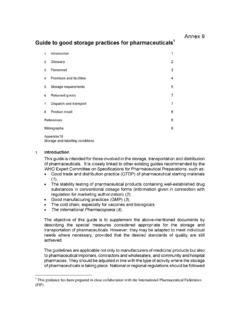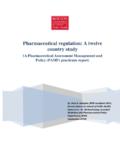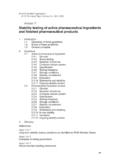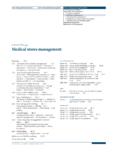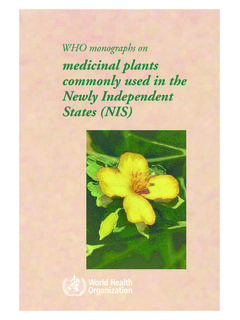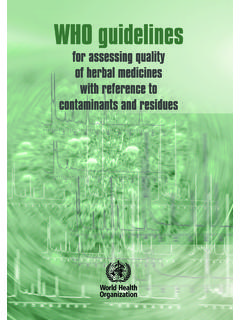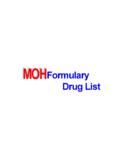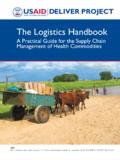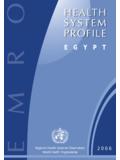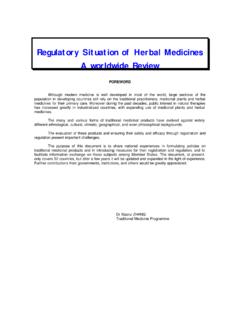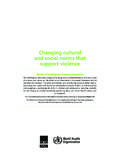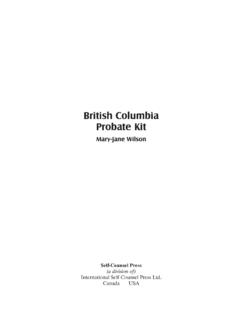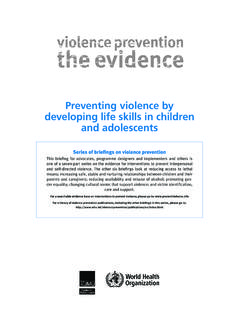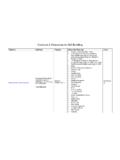Transcription of The Role of the Pharmacist in Self-Care and Self-Medication
1 Contents i The Role of the Pharmacist in Self-Care and Self-Medication Contents 1. Good pharmacy 2. Responsible 3. The increasing importance of Self-Care and Socioeconomic Management of acute, chronic and recurrent illnesses, and Public health and environmental Demographic and epidemiological Health sector Availability of new 4. Role of the Pharmacist in Self-Care and As a As a quality drug As a trainer and As a As a health Specific 5. Standards of The role of international The role of national Formation of 6. Evaluation of performance relating to Self-Care and Self-Medication Structural Process Outcome Role of the Pharmacist in the health care system ii 7. 8. self and peer Ethical and commercial Annex 1: Annex 2: List of Acronyms AESGP Association Europ ene de Sp cialit s Grand Public (The European Proprietary Medicines Manufacturers' Association) DAP Action Programme for Essential Drugs FIP F d ration International Pharmaceutique HAI Health Action International IPF International Pharmaceutical Federation OTC over-the-counter PGEC Pharmaceutical Group of the European Community PMR Patient Medical Record WHA World Health Assembly WHO World Health Organization WSMI World self Medication Industry Acknowledgements The meeting was made possible thanks to financial support from the World self Medication Industry and the International Pharmaceutical 11.
2 Introduction This was the fourth in a series of consultative group meetings on the role of the Pharmacist in the health care system organized by WHO in collaboration with the International Pharmaceutical Federation (FIP). Previous groups met in New Delhi (1988), Tokyo (1993), and Vancouver (1997), dealing with the role of the Pharmacist , pharmaceutical care and preparing the future Pharmacist , respectively. These meetings were held in response to WHO Revised Drug Strategy resolutions relating to the role of the Pharmacist , notably the 1994 resolution WHA This resolution recognizes the key role of pharmacists in public health and the use of medicines. It emphasizes their responsibility to provide informed and objective advice on medicines and their use, to promote the concept of pharmaceutical care , and to actively participate in illness prevention and health promotion.
3 This consultation brought together experts from around the world to express their views on the role of the Pharmacist in Self-Care and Self-Medication . Its objectives were to: identify the main health problems and opportunities that can be addressed by Self-Care and Self-Medication in developed and developing countries; describe the scope of Self-Care and Self-Medication in the prevention and treatment of diseases, indicating their advantages and disadvantages or limits; identify the responsibilities and functions of pharmacists towards consumers, prescribers and manufacturers; define the key functions for community pharmacists in Self-Care and Self-Medication ; identify the ethical and regulatory issues relating to the role of pharmacists in Self-Care and Self-Medication .
4 Good pharmacy practice In 1992, FIP developed standards for pharmacy services entitled Good pharmacy practice (GPP) in community and hospital pharmacy settings , which have since been adopted and presented in a WHO document (WHO, 1996). One of the four elements of good pharmacy practice addressed in this document covers activities associated with Self-Care , including advice about and, where appropriate, the supply of a medicine or other treatment for treating ailments that can be self -treated successfully. In 1993, the charter of collaboration between the Pharmaceutical Group of the European Community (PGEC) and the European Proprietary Medicines Manufacturers' Association (AESGP) noted the following: The Pharmacist is an adviser to the public on everyday health care and is a key figure in the supply and delivery of medicines to the consumer.
5 He is a partner of the manufacturer of non-prescription medicines. Both share the common goals of service of high quality for the patient and encouragement of the rational use of medicines. The Pharmacist in his professional capacity and in direct Role of the Pharmacist in the health care system 2 contact with patients is competent to provide sound advice on the medicines he supplies (PGEC & AESGP, 1993). Increasingly, people are managing a large proportion of their ailments without consulting either a doctor or Pharmacist . Yet pharmacists can play a key role in helping people to make informed Self-Care choices. Self-Care and Self-Medication raise the issue of the responsibility of consumers and patients to ensure that the care or medication they select is appropriate to their needs, safe and effective.
6 Equally, they pose several questions for pharmacists : How are patients and consumers advised regarding the technical and ethical issues associated with Self-Care and Self-Medication ? What determinants and factors must be taken into account regarding the implementation of Self-Care and Self-Medication for the prevention and treatment of diseases in developed and developing countries? What are the key features of Self-Care and Self-Medication in developed and developing countries? Considering the scope of pharmacy and the functions of pharmacists , the role of pharmacists regarding Self-Care and Self-Medication must be specified. Professionals also need guidance concerning how they can best discharge their responsibilities, not only at community level, but also through the development and distribution of drugs.
7 Additionally, ethical, regulatory, pharmacotechnical and quality assurance aspects should be addressed, as well as consumers' attitude and Definitions Several authors, including WHO, have defined Self-Care and Self-Medication . The following are the definitions provided by the consultative group, and on which the current document is based. Self-Care Self-Care is what people do for themselves to establish and maintain health, prevent and deal with illness. It is a broad concept encompassing: hygiene (general and personal); nutrition (type and quality of food eaten); lifestyle (sporting activities, leisure etc.)
8 ; environmental factors (living conditions, social habits, etc.); socioeconomic factors (income level, cultural beliefs, etc.); Self-Medication . Definitions 3 Self-Medication Self-Medication is the selection and use of medicines1 by individuals to treat self -recognised illnesses or symptoms. Self-Medication is one element of Self-Care . Responsible Self-Medication This is the practice whereby individuals treat their ailments and conditions with medicines which are approved and available without prescription, and which are safe and effective when used as directed. Responsible Self-Medication requires that: 1. Medicines used are of proven safety, quality and efficacy. 2. Medicines used are those indicated for conditions that are self -recognisable and for some chronic or recurrent conditions (following initial medical diagnosis).
9 In all cases, these medicines should be specifically designed for the purpose, and will require appropriate dose and dosage forms. Such products should be supported by information, which describes: how to take or use the medicines; effects and possible side-effects; how the effects of the medicine should be monitored; possible interactions; precautions and warnings; duration of use; and, when to seek professional advice. 3. The increasing importance of Self-Care and Self-Medication The role of the Pharmacist has been changing over the past two decades. The Pharmacist is no longer just a supplier of medicines and a concocter of medicinal products, but also a team member involved in the provision of health care whether in the hospital, the community pharmacy, the laboratory, the industry or in academic institutions.
10 1 For the purposes of this definition, medicines include herbal and traditional products. Pharmaceutical care is growing in importance with the challenges of Self-Care . For pharmacists , their greater involvement in Self-Care means greater responsibility towards their customers and an increased need for accountability. Role of the Pharmacist in the health care system 4 The increase in Self-Care is due to a number of factors. These factors include: socioeconomic factors; lifestyle; ready access to drugs; the increased potential to manage certain illnesses through Self-Care ; public health and environmental factors; greater availability of medicinal products; and demographic and epidemiological factors.
